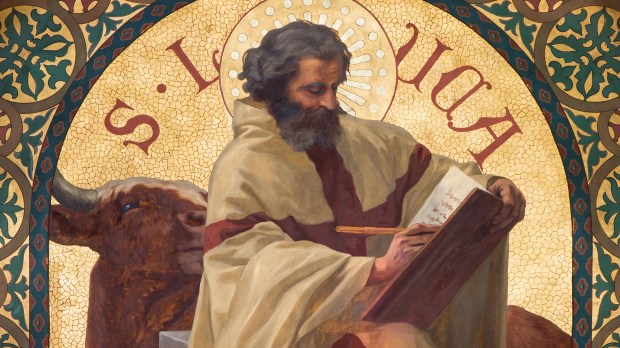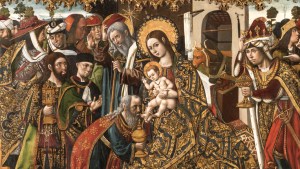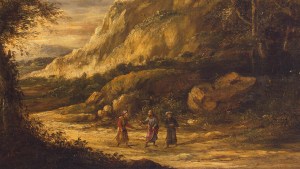On October 18, we celebrate the feast of St. Luke the Evangelist. Which means we celebrate his Gospel, which is truly one of kind, in 10 remarkable ways. Let’s count them.
1. Luke wasn’t Jewish, and proved that doesn’t matter.
The four Gospels’ theological case for Jesus rests very firmly on one thing: He fulfills Old Testament prophecies of the long-expected Messiah. Luke’s Gospel is no different: He has a deep and subtle grasp of the Old Testament, showing the Temple as Jesus’ constant destination, from his childhood to his active ministry.
But unlike Matthew, Mark, and John, Luke does not seem to have been Jewish. St. Paul mentions him with his Gentile friends. For those of us who aren’t Jewish ourselves, this gives us great hope: The Old Testament prophets speak to us, as well.
2. Luke wrote a sequel to his Gospel.
The Gospels all tell the story of the Son of God walking among us then returning to the Father. Luke adds another book telling the story of the Holy Spirit among us in the early Church — the Acts of the Apostles.
3. Luke wrote his Gospel to a particular person.
The beginning of the Gospels are very much what you would expect at the beginning of an ancient story. Matthew begins with a genealogy and both Mark and John literally use the words “the beginning.”
But Luke, on the other hand, begins by telling the “most excellent Theophilus” that he has “decided, after investigating everything accurately anew, to write it down in an orderly sequence for you so that you may realize the certainty of the teachings you have received.”
I like the personal touch: This is one Christian instructing and encouraging another — and us with him.
4. Luke celebrates women.
Luke’s Gospel shows great respect for women, starting with its infancy narratives, featuring Elizabeth and the Prophetess Anna. It continues with his genealogy, which mentions the women Tamar, Rahab, Ruth and Bathsheba as ancestors of the Messiah.
Luke gives details about the women who traveled with Jesus, including Mary Magdalene, Joanna, Susanna, and “many others who provided for them out of their means.” Clearly, women were a key part of God’s plan for the new Church, whether they are active Marthas or contemplative Marys — which is a distinction we get from a story only Luke tells.
5. Luke especially celebrates one woman in particular: Mary.
An old story describes Luke as painting a picture of the Blessed Mother. He uses words to show her to us.
It is from Luke that we hear that the angel said, “Hail Mary, full of grace,” and that Elizabeth called her “Mother of my Lord.” We hear Mary pray the Magnificat in Luke and see her gather the Apostles at Pentecost.
6. Luke is the best-educated Gospel writer.
Luke was a physician, according to Paul — who wrote of Luke two othertimes, also: They were clearly friends, as depicted in the movie Paul, Apostle of Christ.
Physicians in the ancient world were educated in the classics. Luke has a distinctive style in his Gospel’s Greek, showing his mastery.
7. Luke wrote a whopping 25% of the New Testament.
Luke is second only to St. Paul — and then, only barely — in the percentage of pages in the New Testament he wrote. That makes Luke one of the most influential writers in history.
8. You can probably thank Luke for your favorite parable.
Luke isn’t only influential by the quantity of his writing, but by its content.
We know the Prodigal Son and Good Samaritan stories from Luke alone — as well as the Pharisee and Publican, the Rich Man and Lazarus, and others.
9. Luke contributes beautiful details to the Passion of Christ.
Only Luke recounts that an angel helped Jesus in the Agony and the Garden and that his sweat became “like great drops of blood.” Luke, always attentive to women’s involvement, tells us about the daughters of Jerusalem on the Way of the Cross. But he is also willing to notice the contributions of rough characters such as the “thief who stole paradise.”
10. Luke tells a truly unique Resurrection story.
If not for Luke, we would not know the wonderful story of the Lord appearing to two disciples headed out of town on the road to Emmaus. There we get Jesus’ own take on his death and Resurrection, and a telling description of how Christ intends to stay with us now: In the Eucharist.





